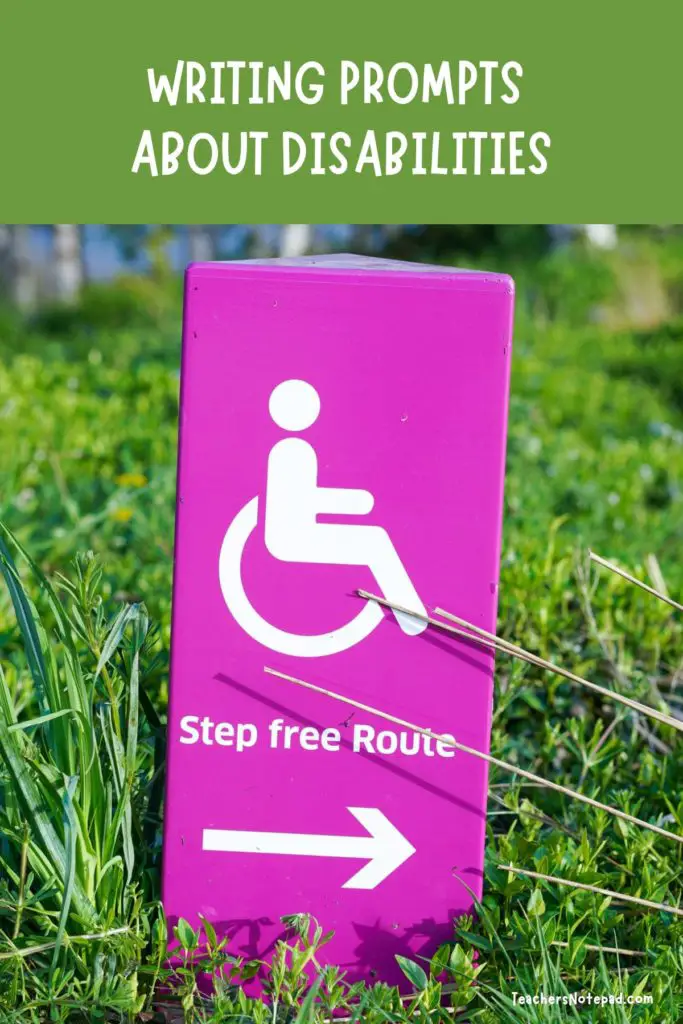Learning about disabled or differently abled individuals is important in teaching children to be inclusive and accepting.
The world is diverse, and what and who students learn about should be just as diverse as the world around them.
Having this knowledge helps students understand how to interact and communicate with people who are different from themselves.
Below, you’ll find a list of writing prompts that dive into the topic of disability and encourage students to become more supportive of their peers.
Using This Guide
These prompts are meant to help students learn about disabilities and put that knowledge into thoughts and actions. They should be used often, as inclusivity should be an ongoing conversation.
Here are a few ways these prompts can be used in your classroom:
- If your classroom is expecting to have a new disabled student, encourage your students to use these prompts to learn more about how they can make their new classmate feel more welcome.
- Challenge students to research tough but completely normal topics, like disability. Encourage them to use one prompt every day for a week in their writing journal.
- Use these prompts in tandem with your community learning curriculum, or as part of your social studies lessons.
The Writing Prompts
- Do you have a disability, or do you know someone with a disability? How is their life different from yours?
- Why is it never okay to use ableist language (i.e. “cripple”, “handicapped”, the “r-word”)?
- What comes to mind when you think about the word “disability”?
- What are the different types of disabilities?
- What is one way that someone’s disability can be seen instead as an ability?
- Why is it important to believe someone went they say they have a disability, even if they look “normal” to you?
- Write a story about a disabled student trying a new sport.
- What does your school do to accommodate students with disabilities?
- What does your community do to accommodate those with disabilities?
- Research a prominent disabled scientist. Write 3-5 paragraphs about their accomplishments.
- What is a chronic illness?
- What is an invisible illness?
- What does it mean to be inclusive? Give examples.
- Write a story about a disabled man running errands.
- Research a disabled artist and write 3-5 paragraphs about their accomplishments.
- Think of someone with a disability. What are three ways you are alike? Three ways you are different?
- How can you be a better peer to a student with a disability?
- How can you encourage your family to be more inclusive of disabled people?
- Research a disability you would like to know more about. Write 3-5 paragraphs about what you learned.
- What are some ways you could include a disabled student in your friend group?
- Why is it important for schools to include disabled students in sports and extracurricular activities?
- Research a disabled movie star, actor, or singer, and writer 3-5 paragraphs about their accomplishments.
- Next time I see someone with a disability, I will…
- What does it mean to be neurodivergent?
- Write a story about a disabled student who is new to your school.
- Write about the history of the Special Olympics.
- Research a disabled athlete and write 3-5 paragraphs about their accomplishments.
- Why is it important to have months, weeks, or days dedicated to raising awareness about disabilities?
- What can able-bodied people learn from disabled people?
- Why is important for people with disabilities of all kinds to be represented in mainstream media?
- What are the five main barriers for people with disabilities?
- What is a learning disability? List three types of learning disabilities.
- Why are special education teachers important in our schools?
- What is assistive technology? List three types of assistive technology.
- What is the number 1 disability in the world?
- Which city is the most disability-friendly?
- How has public transportation improved for disabled individuals in the past 20 years?
Looking For More?
As our students grow, they will learn to become more empathetic and accepting toward those who are different from themselves.
Our site is home to teaching resources, resources for parents, and an abundance of other ways to help your children succeed in the classroom and outside of it.
If you are looking for something specific and can’t find it, reach out and let us know.


